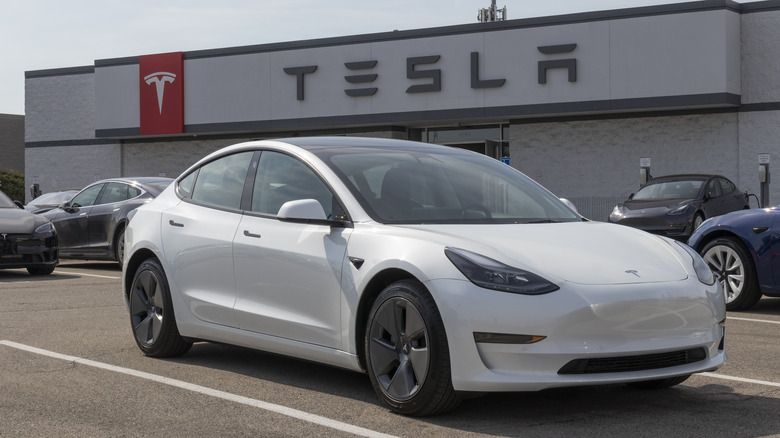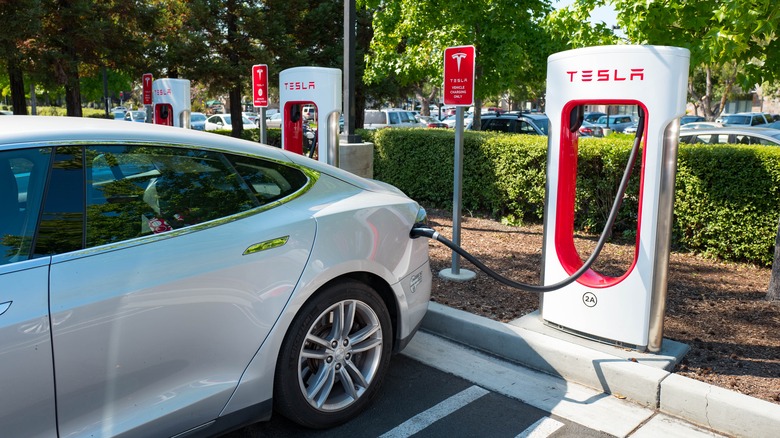Tesla Resale Value: Is It Worth The Investment?
With a Tesla in particular, prices range from $36,490 for the Model Y to $71,090 for the Model S (with discounts such as Federal Tax Credit and estimated gas savings factored in). Needless to say, no model is an insignificant proposition, and with the pace of changes in the EV world, new purchasers may not intend to drive that very same vehicle themselves for long. What many buyers surely want to know, then, is how the resale value of a Tesla will hold up compared to the initial outlay.
With resale value, the Tesla brand overall is in a good position among luxury car makers. According to CarEdge, the luxury brand with the best five-year resale value is Acura, at 86.29%. Porsche and Lexus follow, scoring 82.33% and 79.82% respectively; the latter just barely squeaking ahead of Tesla's 79.74%. Of these brands, of course, Tesla is in a unique position as an EV maker (EVs with a range of intriguing features at that), a fact that clouds the issue of determining how the models' value may fall over time.
Let's look at the former Resale Value Guarantee Tesla offered, and how the different models of Tesla are likely to compare in this regard with the guarantee no longer in place.
The complex issue of the resale value of different Tesla models
In its rundown of 66 luxury models with the best residual value over that same half-decade period, CarEdge puts the Tesla Model 3 in 51st place, at 71.88%, the Model X 17th at 83.00%, and the Model S ranked as the brand's best, reportedly retaining 84.33% residual value over that period. However, it's not as simple as concluding that a Tesla will surely be worth at least two-thirds of its original price five years later. The models are so very different, after all.
In a November 2023 study, iSeeCars concluded that the Tesla Model S and X both lost more value than the average EV over five years and that the Model 3's depreciation (42.9%) was better than that average (49.1%). The value of the Model S in particular, according to the data, lost approximately $60,145 compared to the MSRP. Let's see why that picture is so complicated and seemingly somewhat contradictory.
It's natural that, as EV technology is an ever-developing beast still in its relative infancy, there's less concrete data to draw from. As such, predicting how they'll hold their value can be a difficult business indeed. In August 2023, Autocar quoted Cox Automotive's Philip Nothard as saying, "EV residuals will remain volatile in the short to medium term," with matters such as restrictive leasing and the proliferation of former fleet cars impacting the value of used EVs.
Tesla's former Resale Value Guarantee and the disparity between models
Prior to July 1, 2016, The Verge reported at the time, that Tesla offered a Resale Value Guarantee on models financed by the company. This value, the document specified, was "50% of the original purchase price of the base Vehicle at the time of your purchase, plus 43% of the original purchase price for all options including battery pack upgrade." With this program being discontinued, and with price reductions such as that applied to the Model X at the time, the issue of what a buyer pays for their Tesla and what a resale could be worth becomes more complicated.
Among EVs, a Tesla can be considered a good investment, but the numbers are very different depending on the particular model concerned. iSeeCars' 2024 data suggests that a Model S would fare the worst, worth around $47,590 after five years (43% value), and a Model 3 the best, with a value of 55.9% ($30,986).
As 2023 drew to a close, CleanTechnica reports around 56% of EVs purchased in the United States were Teslas. The brand's influence is undeniable, but so too is the overall resistance to EVs more broadly. While Teslas retain their value better than most EVs (only the Nissan LEAF and Chevrolet Bolt EV kept enough value to join Tesla models in iSeeCars' top five ranking of EV depreciation), the metric for defining their investment value compared to ICEs remains undefined.


